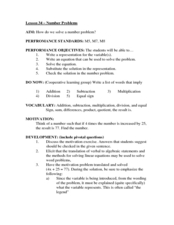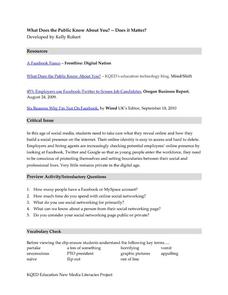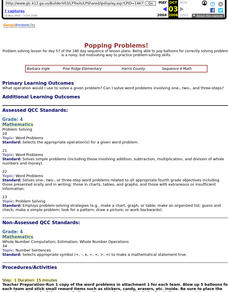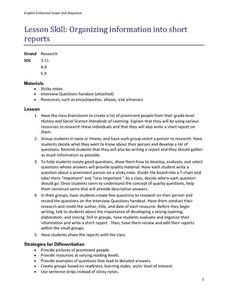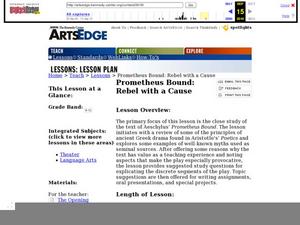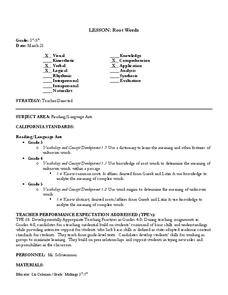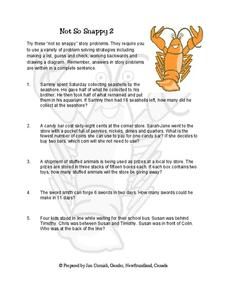Rural Science Education Program
Bees and Flowers – Partners in Pollination
Why are bees so important? After several activities where kids investigate the form and function of flowers, they learn about the different types of bees and label them. They then examine pollen under a microscope and decide which bees...
Willow Tree
Order of Operations
It's the classic please excuse my dear aunt sally strategy to remembering the order of operations. Young mathematicians practice to develop an understanding of the order of operations. Examples and practice problems include absolute...
Curated OER
Number Problems
Students write equations for problems. In this number lesson, students add, subtract, multiply and divide numbers to solve for a variable. They rewrite word problems using algebraic symbols.
Curated OER
What Does the Public Know About You? --Does it Matter?
Young people today have to be very careful with how they present themselves online. Show them the possible impact of their online activity and what employers might see when performing a basic search. The lesson provides a video clip...
Curated OER
Popping Problems!
Turn your math lesson plan into a carnival game with this fun, outdoor activity. After reviewing the concept your class will be practicing briefly, split your class up into teams and head outdoors. These teams work to solve math...
Curated OER
Organizing Info into Short Reports
The class brainstorms a list of prominent people from their knowledge of social studies. Groups of two pupils get together and select one of these people to research. They create five questions to research on their person and record them...
Curated OER
Prometheus Bound: Rebel with a Cause
If you are teaching Aeschylus' Prometheus Bound, you can't afford to miss this source. An extensive list of ideas outlines numerous discussion topics, writing prompts, comprehension questions, oral presentations, and projects. Have class...
Curated OER
Analyzing Two or More Nonfiction Texts
How does recognizing the author's purpose help you draw conclusions about a topic? Using two articles (both are attached), learners brainstorm why each author wrote each article. Are their purposes similar or different? Learners use a...
Curated OER
Problem Solving Model
Use a vocabulary chart to introduce math functions. The class defines a list of mathematical vocabulary terms on a worksheet, as well as completes equations and expressions. They examine word problems and practice transcribing them into...
Perkins School for the Blind
Wheel of Fortune Game
Games are great for practicing any number of basic skills. Here is a set of wonderful instructions for making a braille version of a spinning game, where children win points by correctly reading/identifying the high-frequency words the...
Critical Thinking Cooperative
Doing Our Share
Whether at home or in the classroom, each member of a community has certain responsibilities they must tend to. With the help of the children's story Piggybook by Anthony Browne, kids learn how to assign jobs in a fair and safe manner...
Concord Consortium
Acid Test
This isn't your typical basic lesson—it's more acidic! Learners use pH information to determine the hydroxide ion concentration of different substances and then use these values to analyze information. The calculations require...
Curated OER
How Economic Systems Developed
Students explain the basic functions of the various economic systems. As a class, they identify the main characteristics of capitalism and the advantages of division of labor and specialization. They describe the relationship between...
Curated OER
Multiplication: Mixed Facts (3 of 4)
In this multiplication worksheet, 3rd graders practice basic facts by finding the products in 35 horizontal and vertical problems. They work with facts from 3 to 9.
Haut Gap Middle School
Root Words
Scholars demonstrate their knowledge of root words aqua and aud, and develop vocabulary skills by completing of a chart, handout, and worksheet using creative thinking skills, a dictionary, and a thesaurus.
Curated OER
Choose The Operation
In this choose the operation worksheet, students write when they would use given operations, list words or phrases that help them know when to choose an operation, then solve 2 word problems.
Curated OER
Basics of the Korean War
Students research the key players and major events of the Korean War. Students assigned in groups, research a country involved in the Korean War. Groups then bring their information to the whole groups to explain their country's...
Curated OER
Not So Snappy 2
In this order of operations (i.e., addition, subtraction, multiplication, division) learning exercise, students solve 5 word problems demonstrating their understanding of the concept.
Curated OER
Number Addition Race
Practice basic addition facts and measuring skills. In this addition and measurement lesson, students are provided with drywall tape and work in groups of four at a long table. Partners take turns generating addends and marking the...
Curated OER
Why Mastery of Math Facts is Important
Discover why young mathematicians should master their math facts and use this strategy to motivate their proficiency.
Curated OER
Active and Passive Voice: Finding Examples Online
Incorporate technological fluency with a search for examples of active and passive voice in online resources. Discuss how use of active or passive voice influences mood or tone and contributes to author's purpose. List of...
Curated OER
Symbols in Algebra
Students name and sketch numerical expressions. In this order of operation lesson, students add, subtract, multiply and divide using the correct order of operation. They perform four specific calculations for their motivation lesson.
Curated OER
Getting the Story
Students examine and discuss the basic elements of a newspaper article. They listen to articles, discuss the 'inverted pyramid' style of a breaking news article, and list imaginary current events based on mythological characters.
Curated OER
Pollution Research
Fourth graders explore pollution. They conduct preliminary research on pollution using the internet. Students share their findings with the group. They work with a group and create lists of facts on pollution.




